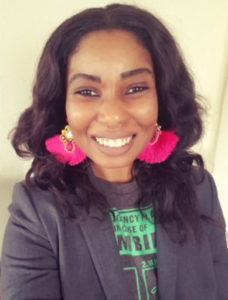
You have probably heard the popular notion that science is objective or the phrase “let the science speak for itself.” In scientific fields like psychology, biology, and medicine, scientists and professionals alike are seen as simply unveiling the raw facts. However, Dr. Imanni Sheppard sees this view as a common, dangerous misperception. The reality is that science doesn’t speak, scientists do.
In the medicine field, Dr. Sheppard’s research demonstrates how the interplay of bias, culture, ethics, and societal factors has contributed to medical inequalities and health disparities in marginalized groups like women and the black community. Her work aims to rectify healthcare inequalities by continuing to deconstruct the societal and cultural norms that surrounded medicine.
Making History
Since 2021, Dr. Imanni Sheppard has been the co-director of Medical Ethics and Humanities in the Carle College of Medicine at the University of Illinois. Additionally, she is an assistant professor and medical education facilitator who has routinely produced research and curricula that show how American culture has influenced the practice of medicine.
Before coming to Illinois, she earned her Ph.D. in Medical Humanities from the University of Texas Medical Branch, becoming the first African American in the U.S. to graduate with a doctorate in the Field!
Health, History, and Racialization
Broadly, the field of medical humanities explores the intersection of medicine, healthcare, and the humanities such as history, cultural studies, etc. Dr. Sheppard’s focus within the field breaks down the cultural and societal norms that surround medicine to better understand how they have informed medical practice throughout time and place. By exploring such history, she traces the causes of long-standing health disparities and works towards ways to make healthcare more equitable and compassionate.
One illustrative example of the significance and implications of Dr. Sheppard’s work is her research concerning women’s health. Sheppard draws on the history of scientific and medicine research to understand why there has not been equal investment in women’s health despite all the technological and social advancements. For example, to get screened for breast cancer, women have to have a mammogram, where they have to literally smash their breasts onto a hard surface to get results.
She has found that the lack of advancement is due to the power dynamics and gender bias within the male-dominated field of medicine. Ancient male physicians and thinkers, like Hippocrates and Aristotle, have deemed women emotional and less rational and such a foundation has dismissed the health concerns or experiences of women until the present day.
The term “hysterical” comes from the Greek word “hystera”, which means “uterus.” Ancient Greeks like Hippocrates and Aristotle believed that many emotional and psychological issues in women were caused by disturbances of the uterus. The term “Hysteria” wasn’t challenged by science until the early 19th and 20th centuries!
This high level of authority over women’s bodies can also be seen even more in the health of black women. There has been a long history of black women undergoing forced sterilization. Presently, black women have the highest infant mortality rates. Through piecing out these patterns, Sheppard has been able to unpack how the history of women’s health affects how it’s viewed and handled today.
Pushing for Change
By emphasizing the lasting effects of cultural and social norms, she urges practitioners of medicine to approach their practice with holism, taking into account that everything and everyone is shaped by a variety of factors, not just one thing. The constant questioning of how practices and norms are developed in science helps keep the field accountable and dedicated to understanding a variety of human beings.
Dr. Sheppard has given lectures for the Smithsonian and has done health impact assessments to encourage the public to understand how the medical field has been and is still being shaped. She has also worked with community organizations to develop medical educational materials and programming.
Her advice for others, especially for women in science, is to be confident in their voices and to carve out spaces for themselves in order to shape a more inclusive society.
Imanni Sheppard was part of the Women in Science Lecture Series and you can find her lecture in the University of Illinois Digital Library.
Medical Sciences Building – home to the Carle Illinois College of Medicine and Dr. Sheppard’s office.
Department of Anthropology . (n.d.). Imanni Sheppard. https://anthro.illinois.edu/directory/profile/iks.
Schnarrs, P. (2023, August 24). 3 minutes with Imanni Sheppard. Association of American Medical Colleges. https://communities.aamc.org/blogs/penny-schnarrs/2023/07/05/3-minutes-with-imanni-sheppard.
Sheppard, I. (2022, October 13). Science as Activism and Agency [Recorded Lecture]. University of Illinois Digital Library. Retrieved from https://digital.library.illinois.edu/items/61d9f460-6f6e-013b-43a3-02d0d7bfd6e4-8.
